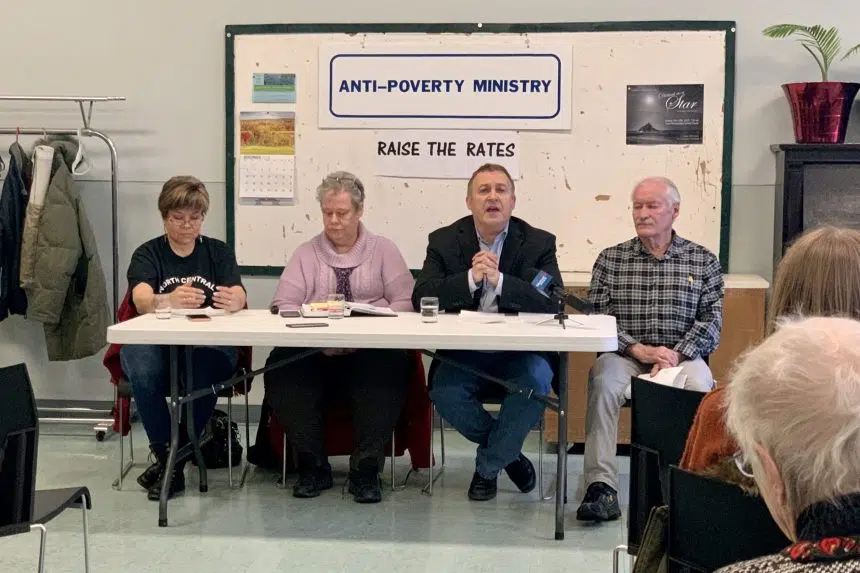It has only been around for five months and already the new Saskatchewan Income Support (SIS) program is doing more harm than good, according to local anti-poverty groups.
On Thursday, representatives from the Anti-Poverty Ministry, Carmichael Outreach, End Poverty Regina and Poverty Free Saskatchewan held a joint news conference, outlining some of the major issues their clients have with the SIS program.
Since the program’s launch in July, Peter Gilmer, an advocate with the Anti-Poverty Ministry, said he has recorded a spike in case loads. From the beginning of August until the end of October, Gilmer said the non-profit saw twice as many cases involving utilities and rental coverage than it did last year, bringing its annual total up to roughly 2,500 cases.
Because the new program doesn’t offer a direct payment option, Gilmer noted that it’s causing problems with rent and utility payments — especially for those with addictions and mental health issues.
“That’s a real concern — but frankly, the much bigger concern is the lack of adequacy,” Gilmer said, noting that people on the SIS program, after meeting all their shelter and utility needs, are left with only about $285 per month.
“Even if you’re the biggest budgeter in the world, maybe the most responsible person in the world, you’re still not in a position to meet your most basic needs — including food, shelter, clothing, utilities, et cetera.
“Every other sector of society has some kind of relationship between their incomes and what the cost of living is, but for people on income assistance programs, it’s completely arbitrary. People get stuck on the same benefits decade after decade.”
Social Services Minister Paul Merriman told reporters after Question Period on Thursday that he has heard from the Saskatchewan Landlord Association regarding concerns around direct billing. However, he sees it as a problem those using income assistance can overcome.
“I have full confidence that our clients have the capacity. There are going to be some circumstances where it’s going to be difficult for that individual to go through the process of paying, but we also have some processes in place that we can have someone take over their financial payments — a guardianship or a trusteeship — so they can be able to help them out through some challenging times if they’re dealing with mental health and addictions,” Merriman said.
“The onus is on the clients to contact us and tell us that they have some concerns. If they’re having some financial problems, then we can again sit down, help them with a budget and try to set things up so they can be successful.”
However, Nairn MacKay, an advocate with End Poverty Regina, said teaching financial literacy isn’t helpful.
“(The Ministry of Social Services) thinks, ‘We train the financial workers in motivational counselling so that we can counsel people out of their poverty.’ How arrogant. How out of touch. People just need money to live — it’s not financial illiteracy, it’s poverty,” MacKay explained.
“There are so many paths into poverty and thanks to this province there are not very many paths out.”
While Merriman maintains the province had ongoing consultation with outside groups leading up to the launch of the SIS program over the summer, Gilmer said there wasn’t enough.
“Frankly, if (the province consults) with those people on the frontlines of the grassroots and those people who are most directly affected by program changes, there would be a development of a better program,” he said. “That’s what we need and that’s what we’re calling for: A better program, better service delivery and, ultimately, much more adequate benefits.”
Gilmer added his clients are also having to deal with poor communication in the social services call centre.
“People are extremely frustrated because they wait for long periods of time, can’t get through, often are looking at dropped calls,” he explained. “So, in terms of the communication between people who are in need of income assistance and the system itself, that has seen a major breakdown over the course of the last few months. It was far from perfect to begin with, but it has only got worse.”
With the anti-poverty groups’ concerns now on Merriman’s radar, he said he’s willing to sit down with them.
“It gives me and my officials an opportunity to have a look at some of their concerns, and I want to see some official recommendations from them on what it is exactly they’re looking for,” he said.
“If there are some process improvements or some things that we need to work on, then we’ll endeavour to look at that, but the foundation of the program will be the same.”
— With files from 980 CJME’s Lisa Schick











